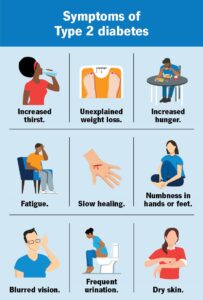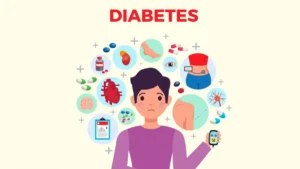Diabetes Causes and Prevention

Diabetes mellitus, commonly referred to as diabetes, is a chronic metabolic disorder affecting millions of people worldwide. It occurs when the body either fails to produce enough insulin or cannot effectively utilize the insulin it produces. Diabetes is a complex condition influenced by numerous factors, including genetics, lifestyle choices, and environmental triggers. In this article, we will explore the primary causes of diabetes and discuss effective strategies for its prevention.
Genetic Predisposition:
One of the leading factors contributing to the development of diabetes is genetic predisposition. Individuals with a family history of the condition are at a higher risk of developing diabetes. While specific genes associated with diabetes susceptibility have been identified, it is important to note that genetic predisposition alone does not guarantee the onset of the disease. Lifestyle choices play a crucial role in determining whether an individual will develop diabetes or not.
Sedentary Lifestyle:
A sedentary lifestyle characterized by limited physical activity is a significant risk factor for diabetes. Regular exercise helps improve insulin sensitivity, allowing the body to use glucose effectively. Lack of physical activity can lead to weight gain, obesity, and an increased risk of developing type 2 diabetes. Engaging in moderate-intensity exercise, such as brisk walking, jogging, or cycling, for at least 150 minutes per week can significantly reduce the risk of diabetes.
Unhealthy Dietary Habits:
Poor dietary choices, including excessive consumption of processed foods, sugary beverages, and unhealthy fats, contribute to the development of diabetes. A diet high in refined carbohydrates and added sugars can cause rapid spikes in blood sugar levels, placing a strain on the body’s insulin production and utilization. Opting for a balanced diet rich in fruits, vegetables, whole grains, lean proteins, and healthy fats can help maintain stable blood sugar levels and reduce the risk of diabetes.
Obesity:

Obesity is a major risk factor for type 2 diabetes. Excess body weight, especially around the abdomen, increases insulin resistance and interferes with the body’s ability to regulate blood sugar levels. Adopting a healthy lifestyle that includes regular exercise and a well-balanced diet can aid in weight management and reduce the risk of developing diabetes.
Gestational Diabetes:
Gestational diabetes occurs during pregnancy when hormonal changes impair insulin action. Women who develop gestational diabetes are at an increased risk of developing type 2 diabetes later in life. Maintaining a healthy weight before and during pregnancy, along with regular prenatal check-ups, can help identify and manage gestational diabetes effectively.
Age and Ethnicity:
Age and ethnicity also play a role in diabetes risk. The risk of developing type 2 diabetes increases with age, primarily due to lifestyle factors and decreased physical activity. Additionally, certain ethnic groups, such as African Americans, Hispanics, Native Americans, and Asians, are more prone to developing diabetes. Awareness of these risks can prompt individuals to make proactive lifestyle changes and seek regular medical screenings.
nsulin Resistance:
Insulin resistance is a condition where the body’s cells become less responsive to the effects of insulin. This condition is often associated with obesity and physical inactivity. Over time, the pancreas may struggle to produce enough insulin to compensate for the resistance, leading to high blood sugar levels and the development of diabetes. Regular exercise, a healthy diet, and weight management are essential for improving insulin sensitivity and reducing the risk of insulin resistance.
High blood pressure and cardiovascular disease:
People with high blood pressure and cardiovascular disease are at an increased risk of developing diabetes. These conditions can disrupt the body’s ability to regulate blood sugar levels and insulin production. Managing blood pressure through lifestyle modifications, such as a low-sodium diet, regular exercise, and stress reduction techniques, can help reduce the risk of developing diabetes.
Polycystic Ovary Syndrome (PCOS):
Polycystic ovary syndrome (PCOS) is a hormonal disorder that affects women of reproductive age. Women with PCOS often have insulin resistance, leading to an increased risk of developing type 2 diabetes. Managing PCOS through lifestyle changes, including weight loss and dietary modifications, can help improve insulin sensitivity and reduce the risk of diabetes.
Smoking:
is a well-known risk factor for numerous health conditions, including diabetes. it increases inflammation, oxidative stress, and insulin resistance in the body, contributing to the development of diabetes. Quitting smoking is crucial for overall health and significantly reduces the risk of diabetes and its complications.
Sleep Deprivation:
Chronic sleep deprivation and poor sleep quality have been linked to an increased risk of diabetes. Inadequate sleep can disrupt hormone regulation, leading to insulin resistance and impaired glucose metabolism. Prioritizing good sleep hygiene, aiming for 7-8 hours of quality sleep each night, can help reduce the risk of diabetes.
Alcohol Consumption:
Excessive alcohol consumption can contribute to the development of diabetes. Alcohol can interfere with blood sugar regulation and increase the risk of obesity and insulin resistance. It is important to consume alcohol in moderation, following recommended guidelines, or consider avoiding it altogether to reduce the risk of diabetes.
Regular health screenings:
Regular health screenings are crucial for the early detection and management of diabetes. Routine blood tests, including fasting blood glucose and HbA1c tests, can help identify pre-diabetes or diabetes at an early stage. Early intervention through lifestyle changes or medication, if necessary, can prevent or delay the progression to full-blown diabetes.

Prevention Strategies:
Now that we have explored the causes of diabetes, let’s discuss some effective prevention strategies
Maintain a Healthy Weight: Achieve and maintain a healthy body weight through regular exercise and a balanced diet.
Engage in Regular Physical Activity: Aim for at least 150 minutes of moderate-intensity aerobic exercise per week, along with strength training exercises.
Make Healthy Food Choices: Opt for whole, unprocessed foods, limit sugary and high-carbohydrate foods, and prioritize fiber-rich foods.
Monitor Blood Sugar Levels: Regularly monitor blood glucose levels, particularly if you have a family history of diabetes or other risk factors.
Stay Hydrated: Drink an adequate amount of water daily to support overall health and assist in maintaining stable blood sugar levels.
Manage Stress Levels: Chronic stress can impact blood sugar levels. Engage in stress-reducing activities like meditation, yoga, or hobbies you enjoy.
Get Regular Check-ups: Schedule regular visits with your healthcare provider to monitor your overall health, including blood sugar levels and other relevant parameters.

Remember, diabetes is a multifactorial condition, and the interplay between genetics, lifestyle factors, and environmental influences determines an individual’s risk. By adopting a holistic approach that includes regular physical activity, a balanced diet, weight management, stress reduction, and maintaining overall good health









